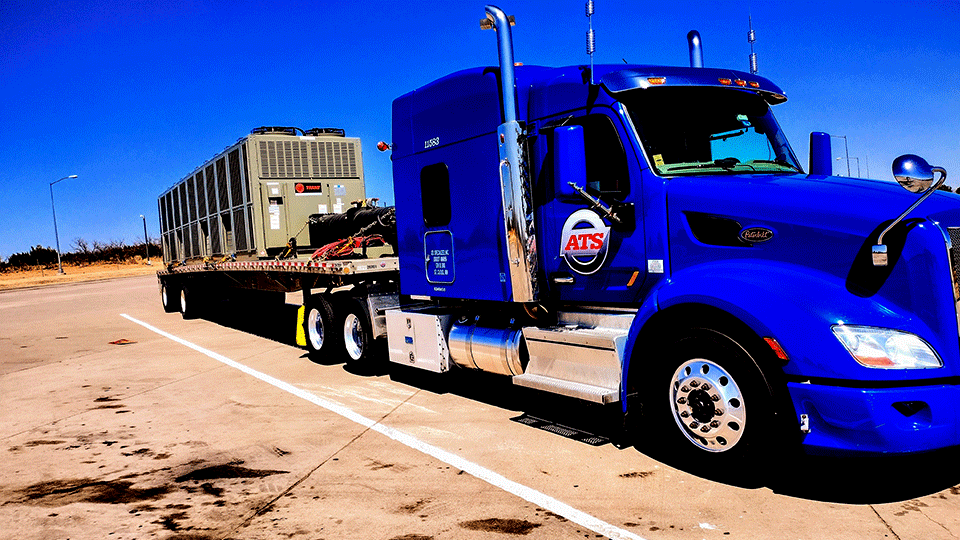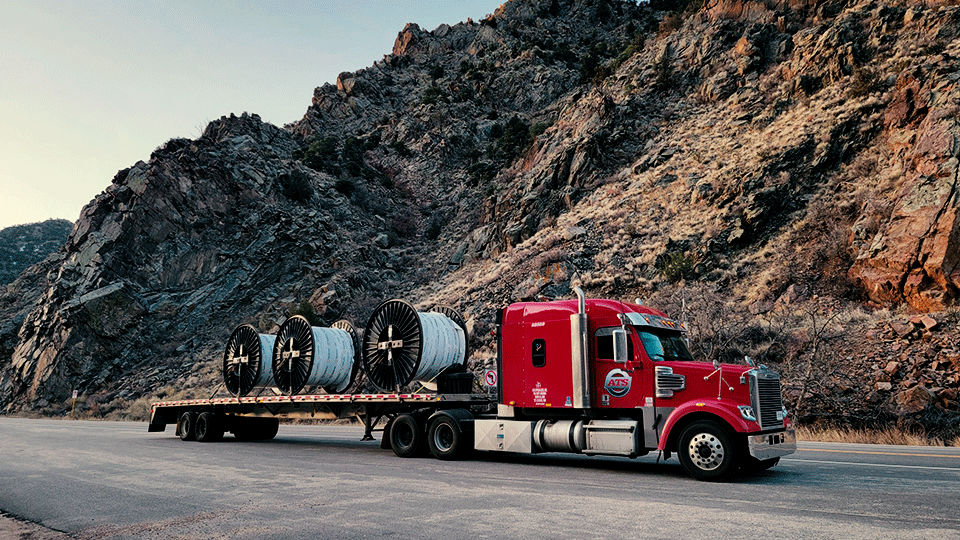Open-deck freight shipping, using a flatbed trailer — or a variation thereof — is a common segment of many supply chains. Flatbed transportation services are used by nearly every industry as these trailers offer a versatile solution that fits a range of circumstances.
In fact, depending on the time of year, utilizing open-deck capacities might actually save you money, compared to its alternatives.
Often, getting the most from your transportation supply chain, and securing the most effective solution for your freight, comes down to how well you understand your options. This knowledge is helpful when it’s time to decide which solution is right for each situation.
Here at Anderson Trucking Service (ATS), we’ve been building up our fleet of open-deck trailers (flatbed, step-deck, double-drop, etc.) since 1955 — our first year as a company. Over the years, we’ve helped a vast array of businesses (in a wide variety of industries) move their cargoes on open-deck trailers.
Sometimes it’s funny how convenient these trailers can make the lives of the companies utilizing them. Whether you’re able to load cargo from the top or side (using a forklift/crane) or plan to exclusively load/unload from a dock, flatbed trailers may be a viable solution for your business.
Without recognizing the applicability of these trailers for their freight, however, sometimes companies fail to consider them at all. In the end, this leads to higher costs (due to a smaller pool of options) and the potential for unnecessary service failures.
In this article, you’ll find a list of common flatbed cargoes as well as some criteria to help you decide whether a flatbed trailer will meet your needs.
What Can Be Shipped on a Flatbed Trailer?
Practically anything that can be loaded onto a trailer from the rear, sides or above and is capable of being firmly secured using chains or straps — or a combination of them — can be shipped on a flatbed trailer.
Flatbed trailers — which are most commonly 48 and 53 feet long — provide adequate cargo space for full-truckload shipments ranging between 43,000-48,000 pounds.
Legally (without permitting), flatbed trailers can have a total loaded height and width of 8 feet, 6 inches. For anything beyond this, permits must be arranged at a state-by state-level.
Each state also has restrictions for both non-divisible cargo overhang and flatbed legal axle weight limits — you can find more information on those here:
How Much Weight Can I Put on a Flatbed Trailer? [an Overview of Flatbed Kingpin Laws]
Can I Overhang Freight on a Flatbed Trailer?
Provided all rules and regulations are observed, you should have no trouble getting your freight transported on a flatbed trailer.
That said, because these trailers provide no insulation or protection from the elements (on their own), food and beverage products — as well as those that are hyper-sensitive to temperature or prolonged exposure to the elements and debris — can’t be moved on a flatbed.
As such, if your freight needs protection from the elements you will either need to use a flatbed Conestoga, tarp your cargo or avoid using an open-deck trailer entirely.

List of Common Flatbed Commodities
Although this is by no means a comprehensive list, flatbed trailers are commonly used to ship all kinds of freight including:
- Lumber
- Structural steel
- Rebar
- Plastics (tubing, PVC pipes, etc.)
- Ceramics
- Concrete/aggregates
- Bricks
- Cinder blocks
- Wire ropes and cables
- Roofing tiles/shingles
- Building envelopes/house wrap
- Marble, granite, limestone, etc.
- Metal joists, frames, trusses, piping
- Wood studs, joists, rafters
- Small bulldozers
- Small excavators
- Small cranes
- Shipping containers
- Auto parts
- Crane parts
- Machine parts (shovels, ladders, tires, etc.)
- Small tractors
- Small generators
- Fabricated steel and metal products (tubing, handrails, tanks)
- HVAC systems
- Engines
The list goes on. Since flatbeds — and other open-deck trailers — are so versatile, they have become a staple piece of many asset fleets. That said, these trailers probably aren’t your only option for moving cargo. Let’s talk about a few of your other options.
 Get Your Freight Moving on The Right Trailer!
Get Your Freight Moving on The Right Trailer!
Now that we’ve listed a few of the many. . . many commodities commonly hauled on flatbed trailers, you’re better suited to select the right transportation option for your business.
However, it’s highly probable that there are multiple trailer types capable of fitting this bill. That’s why your next step is to check out this list of the most common transportation industry trailer types.
In that article, you’ll find a breakdown of more than 10 semi-trailers and links to comprehensive articles on many of them.
At the end of the day, it’s important that you feel confident managing your supply chain. As such, if you still have questions about whether your cargo can be hauled on a flatbed trailer, don’t hesitate to reach out to us here at ATS. We have a transportation expert ready and excited to help you in any way you need.




